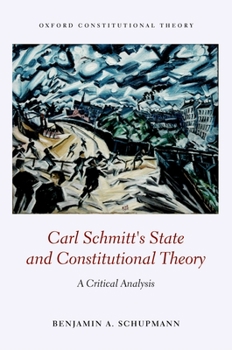Carl Schmitt's State and Constitutional Theory: A Critical Analysis
(Part of the Oxford Constitutional Theory Series)
Can a constitutional democracy commit suicide? Can an illiberal antidemocratic party legitimately obtain power through democratic elections and amend liberalism and democracy out of the constitution entirely? In Weimar Germany, these theoretical questions were both practically and existentially relevant. By 1932, the Nazi and Communist parties combined held a majority of seats in parliament. Neither accepted the legitimacy of liberal democracy. Their only reason for participating democratically was to amend the constitution out of existence. This book analyses Carl Schmitt's state and constitutional theory and shows how it was conceived in response to the Weimar crisis. Right-wing and left-wing political extremists recognized that a path to legal revolution lay in the Weimar constitution's combination of democratic procedures, total neutrality toward political goals, and positive law. Schmitt's writings sought to address the unique problems posed by mass democracy. Schmitt's thought anticipated 'constrained' or 'militant' democracy, a type of constitution that guards against subversive expressions of popular sovereignty and whose mechanisms include the entrenchment of basic constitutional commitments and party bans. Schmitt's state and constitutional theory remains important: the problems he identified continue to exist within liberal democratic states. Schmitt offers democrats today a novel way to understand the legitimacy of liberal democracy and the limits of constitutional change.
Format:Hardcover
Language:English
ISBN:0198791615
ISBN13:9780198791614
Release Date:February 2018
Publisher:Oxford University Press, USA
Length:232 Pages
Weight:1.20 lbs.
Dimensions:1.0" x 6.1" x 9.3"
Customer Reviews
0 rating





